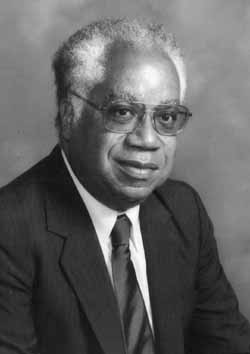Psychologist Joseph L. White Receives Helms Award
This year's 20th Winter Roundtable conference, which annually presents the Janet E. Helms Award for mentoring and scholarship in psychology and education, honored Joseph L. White as the 2003 Helms Award recipient.
White, Professor Emeritus of Psychology and Psychiatry at the University of California, Irvine, has had a distinguished career in the field of psychology and mental health for 41 years. While his title is that of professor emeritus, White's career has been much more than that.
He is known for his efforts during the 1960s and 1970s in challenging the fields of higher education and psychology in their closed-door policy to blacks entering those fields. In many ways, he has his mother to thank for the direction his life has taken. In order to ensure her son would stay in school and not drop out as his older brother did, White's mother sent him to a Catholic school with a college prep program that allowed him to attend San Francisco State College in 1950. There he earned bachelor's and master's degrees in psychology before serving in the Army. After his military service was complete, he looked for work without success and was told that the only way for a black person to get a good job was to hold a Ph.D.
That, he found, was not going to be easy, as many schools rejected his application based on his race. So rather than formally applying to colleges, he sent letters to several programs asking whether they had openings for a student who had graduated with honors and who also happened to be black.
Two schools did accept him, and they were Michigan State and the University of Colorado. He earned his Ph.D. from Michigan State in 1962.
He returned to California to begin his practice as one of only five black Americans in the nation with a doctorate in clinical psychology. White was a faculty member at Cal State Long Beach from 1962 to 1968. His next challenge, after finding a place to live, was to recruit more minority students. "Here we were, right on the edge of South-Central L.A., and out of 15,000 students, we only had 65 blacks." Using a special admissions option that was normally used by the college to recruit top athletes lacking academic standing, he was able to enroll more blacks and Latinos. He garnered the help of Assemblyman Willie Brown to expand the Educational Opportunity Program to the entire state.
In 1968, White also worked with 57 black delegates to the American Psychological Association to demand reform within that organization. White and four other black psychologists met with the executive council to demand that more blacks be admitted to doctoral programs and to change the prevailing conclusions in psychology texts that blacks were an inferior race.
An important article written by White and published by Ebony magazine in 1970, entitled "Toward a Black Psychology" also challenged traditional psychological theories that he explained were inadequate to understand black lifestyles and unfairly led to blacks being defined as deviant or intellectually inferior to whites. Some of what he focused on emphasized the distinguishing characteristics among blacks such as collective, rather than individual, survival; respect for elders; an oral tradition; a spiritual nature; and a fluid, as opposed to a linear, perception of time.
Though today he believes that black psychology is still not totally accepted, the strongest area of acceptability, he says, lies in the practitioners receiving multiethnic psychology in their training.
White has taken a special interest in seeing that black students join the professional ranks, particularly in psychology. At Irvine, White and his colleagues established what they call a "Freedom Train"-which is a network of connections with about eight graduate schools around the country that are receptive to Irvine students. They try to block enroll two or three students at a particular school who can then look after students who come after them.
Published Monday, Mar. 3, 2003
